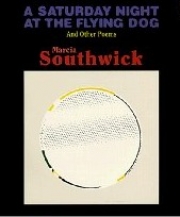Walter Bargen

by Marcia Southwick
Oberlin College Press
1999
$13.95
A Saturday at the Flying Dog, winner of the1998 Field Poetry Prize, is a quantum leap into a universe not found in Southwick’s first two books, The Night Won’t Save Us and Why the River Disappears. The poems in this new book do not begin and end with straightforward narratives or hinge on the turn of a brilliant image. They do not gather their energy solely from the author and her personal reflections. These poems attempt to confront and immerse us in the contradictions of a society sinking from the weight of rampant materialism and consumerism.
Southwick succeeds admirably in describing the chaos and emptiness of such a life. She sees absurdity in the pursuit of things for fulfillment and salvation. What will save us, she believes, is to step back and strip our lives down to the essentials. In the opening poem, “Augery,” we find the future cast “in a teacup, a pair of Nikes, and dust on a windowsill / . . . in a tire’s skid marks, / on the blade of a barber’s shears.” The poem is telling us that we will lose any real chance for a meaningful life if it is based on shopping for “satellite dishes, / burglar alarms and new siding.” In late twentieth century capitalist America the consumer becomes the consumed. We are slaves to our dreams of things that that in the end can’t offer anything better than a planned obsolescent salvation — no matter how much we believe in them. All our striving for the material world fails to outstrip death. “God plays hardball,” Southwick writes. But even God is commercialized, turned into a pumped-up, Wizard-of-Oz, deadbeat dad, who has abandoned his children. Though we claim our part of the fantasy, most of us are not able to claim a part of the real world.
Though these poems are often dark, they are also humorous. Southwick declares, “I want my poems to be less Marcia-centric, so I’ll write / about Star Trek’s Seska the under cover Cardassian spy.” But as an alien spy she takes on the disguise of Barbie, alien in a plastic body alien to women. Though the reader will laugh, these poems are harsh commentaries on how we have trivialized our ambitions, how we have lost sight of anything more uplifting than perfecting a golf stroke, placing our hopes on a winning sweepstakes ticket, the quick fix for our unquenchable material desires.
What can we do to reassert our true selves? In the poem “In the Winter of Our Discontent & Other Seasons,” Southwick advises the reader:
. . .go outside and breathe in the greenery. It’s a nice evening
with ground squirrels & blueberries
. . . It’s a perfect night for tadpoles to nestle in the mud. Or
for getting sucked through a wormhole in the Gamma Quadrant.
Underlying this and many of the other poems is a Thoreauvian love of nature and simplicity, a desire to find out what’s behind the empty, ephemeral deluge of things. What does the poet find there? That whether of not life has meaning, one can find meaning in living. In the poem “Stone Worship,” Southwick writes, “I could have spent an entire lifetime laughing in despair / but instead I worshipped a black stone.” This is not a despairing book, but it is filled with warnings. So what is the fate of poetry in a materialistic age like this one? In “A Portrait of Larry with Trogons,” an elegy for her late ex-husband (the poet Larry Levis), Southwick writes:
It’s also difficult to find the exact right words for poetry
when they’re camouflaged against the background of speech,
newspapers, and T.V. If you were to see the trogon
against a white wall, you’d be dazzled by its brilliance.
It’s easy to see W.C. Williams red wheel barrow here: let the image speak for itself, let the image bring us back to the real world. Marcia Southwick accomplishes this in poem after poem, as she leads us out of the chaos and into our essential lives.
Walter Bargen has published a number of books of poetry, including Fields of Thenar, Mysteries in the Public Domain, Yet Other Waters, and The Vertical River. He is coeditor of the anthology Rising Waters: Reflections on the Year of the Great Flood. His work has been published widely in a number of reviews, including Denver Quarterly, Missouri Review, Poetry Northwest, and Seneca Review.

